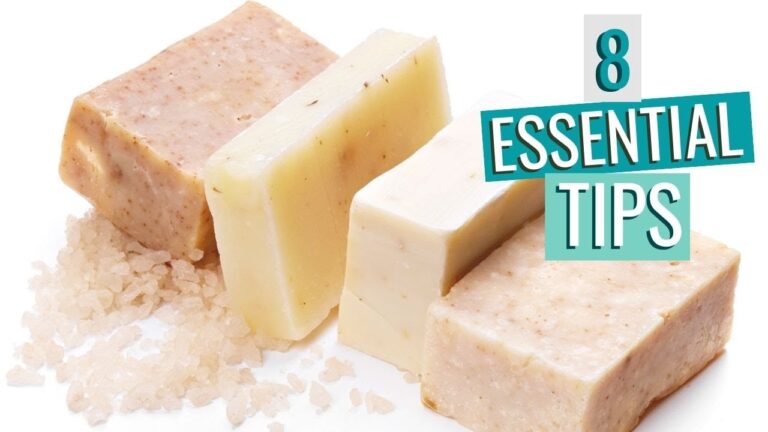When it comes to making handmade soap, choosing the right oils is essential for creating a high-quality product. The type of oils used can greatly impact the soap’s lather, moisturizing properties, and overall performance. With so many options available, it can be overwhelming to know which oils to use. In this article, we will explore the best oils for making soap, their benefits, and how to choose the right ones for your specific soap-making needs. Whether you’re a beginner or a seasoned soap maker, understanding the different oils and their properties is crucial for creating beautiful, nourishing handmade soaps.
What is the process for selecting oils for soap making?
When choosing oils for soap making, it’s important to consider the properties they bring to the final product. For a softer bar that takes longer to trace, pure olive oil is a great choice, and can be used up to 100% in cold process soap. Additionally, incorporating palm oil can add a unique feeling to the soap, helping to harden the bars and create lather when paired with coconut oil.
Careful consideration of the oils used in soap making can lead to a high-quality product with desirable characteristics. Pure olive oil creates a softer bar, while palm oil adds unique qualities and helps to harden the soap. By understanding the properties of different oils, soap makers can create a product that meets their specific needs and preferences.
What oil is most suitable for making soap?
When it comes to making soap, the best oils to use are olive oil, palm oil, and coconut oil. These oils are known for creating a high-quality soap that lathers well and is gentle on the skin. By combining these oils with others that have different properties, you can create a unique soap that meets your specific needs.
Coffee butter is another great option to consider when making soap. With its natural caffeine content and delicious coffee scent, it adds a luxurious touch to any soap recipe. Not only does coffee butter have a soft consistency that makes it easy to work with, but it also adds moisturizing properties to the soap, leaving your skin feeling smooth and hydrated.
In conclusion, when choosing the best oil for soap making, it’s important to consider the properties of each oil and how they will contribute to the final product. Olive oil, palm oil, and coconut oil are all great options that create a high-quality soap, while coffee butter adds a unique touch with its caffeine content and delightful scent. By experimenting with different oils and combinations, you can create a soap that is perfect for your skin and meets your individual preferences.
What are the best essential oils to use in soap?
For a refreshing and invigorating scent in soap, consider using peppermint essential oil. Its cooling and minty aroma can help awaken the senses and leave the skin feeling refreshed. Peppermint is also known for its antimicrobial properties, making it a great addition to soap for its cleansing benefits. Additionally, peppermint blends well with a variety of other essential oils such as lavender, eucalyptus, and lemon, allowing for endless possibilities for creating unique and appealing scents in soap.
Essential Guide to Choosing Soap-making Oils
Are you looking to start making your own soap but feeling overwhelmed by the variety of oils available? Look no further than this essential guide to choosing soap-making oils. When selecting oils for soap-making, it is important to consider factors such as the oil’s properties, scent, and how it will affect the final product. Whether you are aiming for a moisturizing bar or a luxurious lather, this guide will help you navigate the world of soap-making oils with confidence.
With this comprehensive guide, you will be able to make informed decisions on which oils to use in your soap recipes. From coconut oil for a bubbly lather to olive oil for a creamy texture, each oil brings its own unique benefits to the soap-making process. By understanding the properties of different oils and how they interact with each other, you can create custom blends that cater to your specific skincare needs. Say goodbye to store-bought soaps and hello to personalized, handmade bars that will leave your skin feeling nourished and pampered.
Crafting Quality Soap: Oil Selection Tips
Crafting quality soap requires careful consideration of oil selection to ensure the best results. When choosing oils for soap making, it is important to select high-quality oils that will yield a luxurious lather and moisturize the skin effectively. Some popular oils for soap making include coconut oil for its cleansing properties, olive oil for its moisturizing benefits, and shea butter for its nourishing qualities. By selecting the right combination of oils, soap makers can create a product that is not only effective in cleansing the skin but also leaves it feeling soft and hydrated. Experimenting with different oils and finding the perfect blend can lead to the creation of a truly exceptional bar of soap.
Enhance Your Soap Recipe with the Right Oils
Are you looking to take your soap-making skills to the next level? Enhance your soap recipe with the right oils to create luxurious and nourishing products. By carefully selecting oils such as olive oil, coconut oil, and shea butter, you can customize your soap to cater to specific skin types and preferences. These oils not only add moisture and richness to your soap, but they also contribute unique properties such as lathering ability and hardness.
Experimenting with different oil combinations can lead to endless possibilities for creating unique and personalized soaps. Whether you’re aiming for a silky smooth texture, a rich and creamy lather, or a bar that is gentle on sensitive skin, the right oils can help you achieve your desired results. Consider incorporating oils like avocado oil for its moisturizing properties, or castor oil for its ability to boost lather. With the right oils, you can elevate your soap-making game and craft products that stand out from the rest.
Incorporating the right oils into your soap recipe is key to creating a product that not only cleanses but also nourishes and pampers the skin. From selecting oils based on their properties to experimenting with different combinations, there are endless ways to enhance your soap-making experience. So why settle for ordinary when you can elevate your soap recipe with the perfect blend of oils? Take your soap-making skills to new heights and indulge in the art of crafting luxurious and customized soaps that will leave your skin feeling pampered and rejuvenated.
When it comes to creating handmade soap, selecting the right oils is crucial to achieving the desired results. By carefully considering the properties and benefits of different oils, soap makers can create products that not only cleanse and nourish the skin, but also deliver unique scents and textures. Whether aiming for a luxurious lather, moisturizing properties, or specific skin benefits, the oils chosen for handmade soap play a key role in the final product. With a thoughtful approach to oil selection, soap makers can craft beautiful and effective soaps that cater to their specific needs and preferences.



